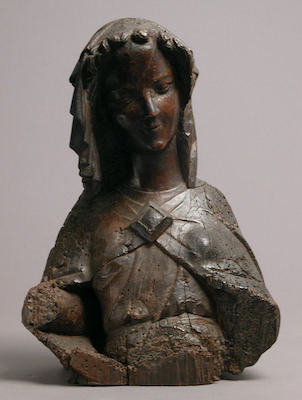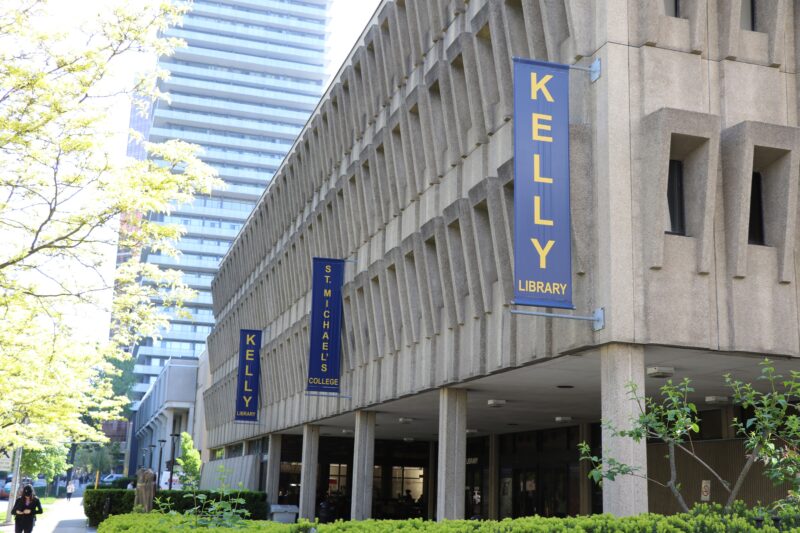From using a sack of potatoes as a visual aid to making cultural references to works as disparate as Plato’s Republic and television’s Desperate Housewives, the recent St. Michael’s College Research Colloquium was as entertaining as it was informative.
The annual event, held this year on March 23, showcases the research and presentation skills of students studying at St. Michael’s. The event mirrors the experience of an academic conference, where students write and submit an abstract as part of the application process and then present their research to an audience, field questions from attendees, and receive feedback from faculty respondents.
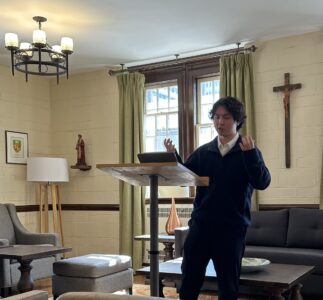
“The purpose of the event is to encourage fruitful collaboration between the student population and St. Mike’s faculty and fellows,” says Dr. Bernadette Guthrie, Interim Director of the Junior Fellows Program and organizer of the day.
“The Colloquium affords undergraduate students the opportunity to present their work publicly to members of the larger academic community. This experience also offers an invaluable experience for those students planning to pursue graduate studies.”
The day-long colloquium, which saw participation from five faculty members, featured two student panels that addressed the theme of “Labour, Leisure, and the Good Life”. In the morning panel on “GenderLeisure/Gendered Labour,” Elinor Egan (a double major in Christianity & Culture and Slavic Languages and Culture), presented on “‘Women’s Work’ through the Lens of the Christian Imagination”, while Cinema Studies major Brian Tin shared his paper, “Let’s Talk Cooking: Gendered Marketing for the Nintendo DS and User-fying Women Gamers.”
The afternoon session saw three papers presented on the theme of “The Work of Art, the Work of God, and the Work of Contemplation.” English Literature major Bridget Bowles spoke on “Withstanding the Loss of Beauty and Dignity: Bede, Caedmon, and the Labour of Poetry in Early Modern England; Mediaeval Studies major Para Babuharan offered a paper titled “Opus Dei: Worship and Work in the Rule of St. Benedict”; and Hoda Sadek, currently studying Political Science, Philosophy and History, delivered a paper titled “Enlightenment: The Importance of Outward Contemplation for a Good Life.”
St. Michael’s Junior Fellows also played a role in the day, developing this year’s theme and helping draft the language of the Call for Papers. They adjudicated the submissions, grouped the papers into panels, and helped locate respondents. Two junior fellows, Dang Pham and Joseph Dattilo, served as moderators for the student panels.
For Tin, whose research focussed on gendered video game marketing, “the colloquium could not have been timelier.” He had learned about the event from his independent project supervisor, Prof. Felan Parker. Noting that his goal had always been to publish or present his work somewhere, he took the 40-page independent study project and focused on two sections, creating a new, shorter paper for the event.
“The version I presented at the colloquium was a mixture of two parts (out of the total seven) of the original paper. …Writing a version for the colloquium did make me think about and articulate my arguments more carefully.”
The day began with a keynote address – “Irish Lumpers: Appetite and Political Economy Before the Great Famine”—delivered by Prof. Padraic Scanlon, an associate professor in the University of Toronto’s Centre for Industrial Relations and Human Resources and the Centre for Diaspora & Transnational Studies. Scanlon, who is a Senior Fellow at St. Michael’s, gave a lively talk in which he used a sack of potatoes to challenge figures and stereotypes about the pre-famine Irish.
The day concluded with a faculty roundtable on Labour and Leisure in the Intellectual Life.
“I hope students come away from the event with a sense of confidence in their own role as budding scholars and in their ability to develop and refine their ideas through the process of conversation and critique,” says Guthrie. “I also hope that the Colloquium served as a site of intellectual friendship, one that afforded students the opportunity to forge connections with faculty and fellows beyond the classroom.”
Extended deadline: January 19, 2024, at 4 p.m.
From May 28 to May 30, 2024, St. Michael’s College, in the University of Toronto, in partnership with the Department of Foreign Affairs of Ireland, will be hosting a conference titled: “Canada, Ireland, and Transatlantic Colonialism: Historical Perspectives.“
The themes of the conference include– Ireland and the Colonial Apparatus of British North America; Irish Religious Mission and Colonization; Transatlantic Technology and Migrant Communities; and Post-Colonial Nationalism in Canada and Ireland. There will also be a special session on Indigenous-Irish Settler Engagement.
Keynotes include Christopher Morash (Trinity College Dublin), Deirdre Raftery (UCD), Donald H Akenson (Queen’s University, Kingston), Heidi Bohaker (University of Toronto), and S. Karly Kehoe (St. Mary’s University, Halifax).
Proposals for papers can be sent to Professor Mark G McGowan, Program Chair, at mark.mcgowan@utoronto.ca, by Friday, January 19, 2024, at 4pm
Dr. Felan Parker is a Professor in the Book & Media Studies program specializing in digital media, video games, and media industries. His current research explores the production, distribution, and reception of independent or “indie” games, and the role of fan conventions like San Diego Comic-Con in contemporary popular media cultures.
University of Toronto Quarterly recently published Prof. Parker’s review of The Far Shore: Indie Games, Superbrothers, and the Making of Jett, as part of their big “Letters in Canada 2021” omnibus issue.
San Diego Comic-Con (SDCC) is not just any comic con, it’s the Comic-Con – with a copyrighted hyphen to prove it. Although fan conventions celebrating popular media like comics, games, film, and television can be found in all corners of the world, SDCC occupies a privileged place. Over the course of its 50+ year history, SDCC has become a key venue for both grassroots fan community and large-scale media industry promotion, driven by much-vaunted claims of exclusivity: exclusive collectibles, exclusive previews, exclusive celebrity appearances, and exclusive access (approximately 130,000 people attend each year, many more wish they could). The convention takes place over five days in July and offers something for practically everyone: panels and workshops large and small, cosplay (dressing up as pop culture characters), signings, a massive exhibition hall full of retail booths, screenings, gaming, interactive promotional activations, portfolio reviews for aspiring creators, and a lot of walking around and waiting in line.
SDCC has been the subject of extensive academic research; it offers a unique site to investigate the relationship between audiences and media industries, and the intermediaries (including SDCC itself) that shape those relationships. This is a rich body of work, but the daunting scale and scope of SDCC means that every attendee has a different experience, and it is impossible for one researcher to apprehend the event in its totality. My colleague Benjamin Woo (Carleton University) and I decided to try something different: what if we studied SDCC with a large, coordinated team of researchers?
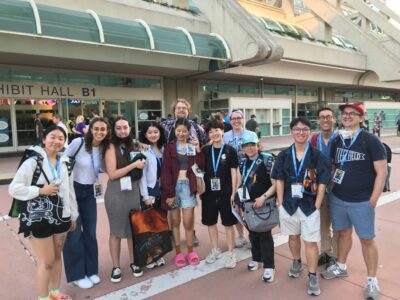
Inspired by previous methodological experiments in “swarm ethnography” and “collaborative event ethnography,” we assembled an all-star team of fandom and media industry scholars, graduate students, and undergrad students from the Book & Media Studies program. The goal of this project, dubbed Swarming San Diego Comic-Con, was to better understand the role of SDCC in contemporary popular culture by conducting up-close and personal ethnographic research from a wide variety of different perspectives, simultaneously. We successfully applied for a SSHRC Insight Grant to support a research trip to SDCC, originally scheduled for 2021 but ultimately delayed until 2023 by the ongoing pandemic.
After a crash course in ethnographic research methods and a test run at the much smaller, less mainstream Toronto Comic Arts Festival, we set out for San Diego with our six intrepid undergrad researchers in tow. Even after reading extensively about SDCC and hearing from more seasoned con-going members of the team, nothing can prepare you for its overwhelming magnitude and dizzying range of activities demanding your attention. For Shurui Wu, the research trip allowed her to combine her life-long fandom with her academic interests – disembarking the trolley in front of the San Diego Convention Centre for the first time and seeing the massive crowds of fellow fans was a “dream come true.”
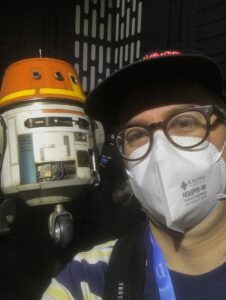
Over the course of SDCC, the “undergrad squad” (as they dubbed themselves) had many unique and exciting experiences. Along with several other members of the team, Esmé Sanders was delighted to have the opportunity to see Japanese horror comics master Junji Ito in the flesh. “Lining up for 2+ hours and getting front-row seats was rewarding and made me feel like I got the full Comic-Con experience. I enjoyed watching Junji Ito draw live. It’s a privilege to see the behind-the-scenes process of some of your favourite art!” Jae Kim and Brian Tin shared their own similar experience of getting up before the crack of dawn and joining a huge line to score an exclusive Star Wars Tamagotchi toy featuring Grogu, AKA Baby Yoda.
Indeed, lining up is a big part of attending SDCC, and the lines not only build anticipation but also are important space for community-building. Jae Kim found the environment more friendly than he imagined, highlighting the important social aspect of the convention that is easily overshadowed by the flashy Hollywood promotion and consumerism. “Starting up conversations with people in lines, by the entrance, and even in washrooms came to me like second nature. In a way, it reminded me that we were all at SDCC because we were all fans, which was a nice sentiment to have amidst the chaos.” Likewise, Debi Jin was thrilled to happen up on an autograph signing session with Makoto Yukimura, creator of the popular manga and anime Vinland Saga. Although the signing was only for people who registered in advance, she joined a small group of fans looking on. “As I looked at the faces of those in our little group, however, it seemed to me that we were all just happy to be in Makoto Yukimura’s presence. After he signed the last lucky fan’s merchandise, we all clapped and slowly went our separate ways.” The experience of seeing beloved creators in the flesh is enhanced by the communal atmosphere of the con.
Students also observed that the demographics of SDCC were not what they expected based on their experiences in fan cultures, which are often unwelcoming spaces for women, people of colour, queer folks, and other groups marginalized on the basis of identity. “Before going, I expected a hyper-masculine space filled with sweaty (and sometimes smelly) fans (myself included),” Brian recalls. “But the diversity of con-goers, in terms of age, gender, race, really pleasantly surprised me (and the venue smelled reasonably fine).” Nevertheless, there remain many issues around inclusivity and access. Esmé noted that while there were many fans with disabilities in attendance, accessibility accommodations were lacking: “it still seemed like a hectic place to navigate with an assistive device. It underscored the need for even more comprehensive accessibility measures at events like these.”
Although SDCC 2023 was billed as a return to form after several years of online and smaller-scale cons, the announcement of strike actions by the Writers Guild of America and later the Screen Actors Guild-American Federation of Television and Radio Artists against the Alliance of Motion Picture and Television Producers made labour issues in Hollywood and beyond a unexpectedly central area of interest for the project. Would SDCC be diminished by the lack of big Hollywood stars promoting their work? Or would it be a return to an imagined grassroots past before Hollywood took over? Even though she would have liked to see celebrities, Shurui wasn’t too disappointed, because there was still plenty of exciting content from other sectors of the global entertainment industries. “I was surprised by how many Japanese companies where there, and the scale of their booth and activations. This made me finally understand how influential Japanese [media] industry is.”
The focus on labour issues also raised questions about how fans are compelled to participate in marketing and promotion. “One moment I found particularly striking was when fans were lining up to advertise (post) on social media pictures of the Hello Kitty x MetaZoo booth for a chance to win a gift basket,” Esmé says, echoing fan studies discourses on fandom as a form of unpaid labour. “It felt like a lot of physical labour and free advertisement.”
The research trip concluded with a debriefing and brainstorming session with the whole team at UC San Diego, where students compared notes, shared insights, posited initial observations, and raised unanswered questions that will help guide our research as we move into the data analysis and knowledge mobilization phases of the project. These invaluable contributions from Book & Media Studies students will help shape our understanding of San Diego Comic-Con and its place at the intersection of popular media industries and fan cultures.
Read other InsightOut posts
Regis St. Michael’s Faculty of Theology members Cynthia Cameron and Hilda Koster have received a “Moving Foward in Mission” grant from the Association of Theological Schools for US$ 25,000.
The “Critical Conversations in Catholic Education: Educating Towards Ecological Resilience in a Climate Justice Curriculum” project aims to foster robust conversation around important theological and social issues facing Catholic educators in ways that empower these educators to think in theologically and pedagogically creative ways. The climate crisis, in particular, impels people of faith to engage the griefs and anxieties of students and teachers as we come together to build communities committed to socio-ecological resilience. As a Faculty of Theology, building conversation about climate anxiety, resilience, and place-based pedagogy enables us to better serve those who teach the next generations of Catholics committed to climate justice.
This grant will fund a series of three events, both in-person and live-streamed, at school board sites around the GTA during the 2023-24 school year with a final half-day conference on the University of St. Michael’s College campus in early summer 2024.
The project is co-directed by Dr. Cynthia Cameron, Patrick and Barbara Keenan Chair of Religious Education and Assistant Professor of Religious Education and Dr. Hilda Koster, Sisters of St. Joseph of Toronto Associate Professor in Ecological Theology and Director of the Elliott Allen Institute for Theology and Ecology, Regis St. Michael’s Faculty of Theology, University of St. Michael’s College.
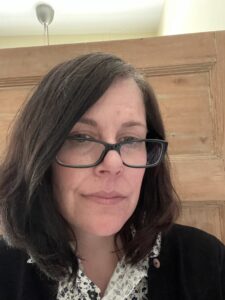
Dr. Callie Callon has joined the Principal’s Office as SMC’s Research Officer. In this role, Callie will provide a range of research resource services for faculty members and for professional librarians. Callie holds a PhD in Christian Origins from the Department for the Study of Religion at the University of Toronto. She is thrilled to be rejoining the St. Mike’s community.
Callon has previously taught courses on the New Testament and Women in the Church at the Faculty of Theology and in the St. Mike’s Christianity and Culture program. She has a strong track record of writing successful academic grants and is looking forward to helping her colleagues further contribute to St. Mike’s already robust reputation for academic excellence. Dr. Callon take up her new role on April 10, 2023.
Cynthia Cameron, Assistant Professor of Religious Education and the Patrick and Barbara Keenan Chair in Religious Education, has received a US$2500 fellowship grant from the Wabash Center for Teaching and Learning in Theology and Religion in Crawfordsville IN. The grant follows her participation in the 2022 Hybrid Workshop for Early Career Theological School Faculty and supports her continued exploration of liberatory learning in graduate theological education.
Her funded project, entitled “Canadian Indigenous Pedagogies for Theological and Religious Education,” explores best practices informed by Indigenous scholars of critical pedagogy with an eye towards cultivating a stance of ally-ship in the struggle for reconciliation. Her goal in learning about Indigenous pedagogies is not only to incorporate them into her regular practice of teaching at the Regis St. Michael’s Faculty of Theology, but to invite her students to think theologically and pedagogically about their own practices of religious education, faith formation, and pastoral ministry.
On May 15, 2022, at the invitation of Ireland’s Taoiseach (Prime Minister), Micheál Martin, University of St. Michael’s College Principal Mark McGowan was part of a small group commemorating the 175th Anniversary of the beginning of the Great Irish Famine.
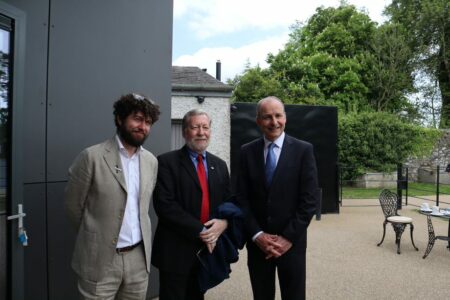
The memorialization took place on the grounds of the National Famine Museum, Strokestown, County Roscommon, where Mark has focused his research since 2013. He served on the Historical Advisory Panel for the newly renovated museum, soon to re-open in June 2022.
Dr. McGowan is an historian renowned for his work on the Catholic Church in Canada and the Great Irish Famine, as well as the lasting impact that the Famine’s mass migration had on Canada.
He is currently doing research in the archives of the old St. Patrick’s College and the collections of All Hallows College in Maynooth, Ireland.
Photo credit: Jason King, Irish Heritage Trust.
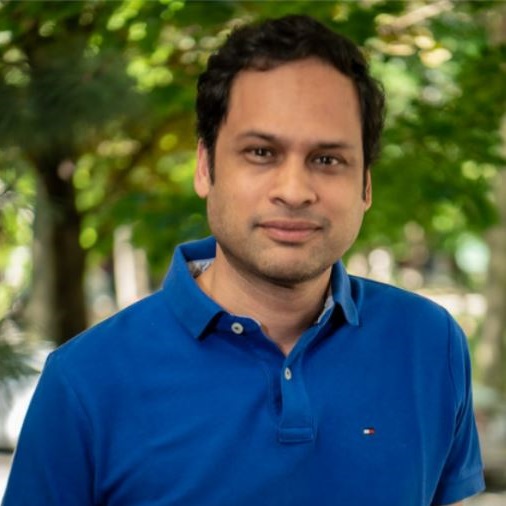
Faculty of Theology professor Dr. Darren Dias, OP has been awarded a grant from the Templeton Religion Trust in conjunction with Profs. Stephan van Erp, Inigo Bocken, and William Desmond of KU Leuven to work on a multi-year project entitled Metaphysics, Contemplation and the Religious Life.
The project, which will see the University of St. Michael’s College and Leuven each host a conference, includes the appointment of Dr. Jacob Benjamins to a post-doctoral position at St. Michael’s to teach and work on conference planning. The project’s work, which falls under the grant’s Widening Horizons in Philosophical Theology initiative, will run from 2022 to 2024.
The project, explains Dias, will explore the tension between metaphysics and theology using methods familiar to continental philosophy—an approach rooted in the thought of 19th- and 20th-century Western Europe—to examine the contemplative practices of the philosophical and theological schools of religious orders and congregations. The project will see scholars working in phenomenology and metaphysics, as well as systematic, mystical, and historical theology, calling on contemplative practices from within the religious schools as a way to support new, practical forms of thought in the twenty-first century.
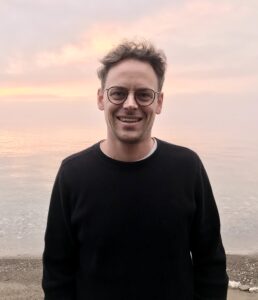
Whereas the past century has seen a rise in a perceived disconnect between metaphysics and theology, this joint project aims to demonstrate that there exists a “metaphysics of contemplation,” which is based not in an abstract approach but grounded in historical, communal, and performative ways of encountering reality as a whole, he says.
There are broad practical applications to the project, notes Benjamins.
“We would like to demonstrate that religious orders have the resources available to enrich spiritual traditions in modern life,” he says.
The first seminar will take place at Leuven December 1 to 4, 2022, hosted by the university’s Interfaculty Centre for Catholic Thought, with a second conference at St. Michael’s March 22 to 24, 2023.
Ever wonder how all the disparate aspects of a university fit together—how the sciences inform the arts or why breadth requirements matter or what the benefits of a degree in the humanities might be? These weighty and compelling questions will be part of the conversation this coming Saturday at the fourth annual St. Michael’s student research colloquium, where some of our community’s brightest minds will make their arguments on how the knowledge we gain in particular subjects fits together as a whole.
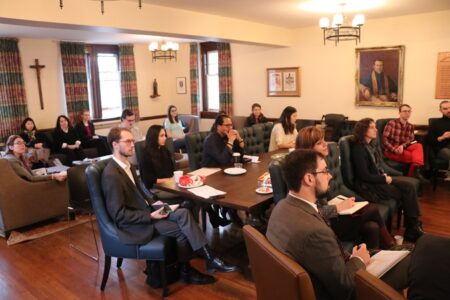
Knowledge, Belief, Wisdom: What’s Universal About the University? begins at 1 p.m. March 26 in the Basilian Common Room. The event presents the work of both undergraduate and graduate students in the St. Michael’s community. The afternoon will include three panels of four presenters each—one group presenting papers on Literary Visions of the University’s Mission, one on Seeking Truth in the University, and a final panel on A Feeling for Knowledge: Affect, Encounter, and the University.
Gilson Post-Doctoral Fellow Bernadette Guthrie, one of the organizers of the colloquium, says the topic stems from conversations she and some of St. Michael’s junior fellows had with students over the course of the year, reflecting their questions and interests.
The event allows students at various stages of their academic careers to present to, and to learn from, each other, whether it is an undergraduate listening to the arguments presented by a doctoral student, or a graduate student aspiring to teaching listening to the kinds of questions raised by a second-year student.
But the event is also an opportunity for the university to appear in a rich and robust way as it seeks a shared understanding in able to respond to problems in the modern world, Guthrie says.
“I am so struck by the student community at St. Mike’s,” says Guthrie, noting how impressed she is with things like student-organized reading groups, informal conversations between professors and students after class, and the welcoming atmosphere.
It is precisely that community that drew Molly Franssen Keenan to this year’s colloquium. While a first-year student at the neighboring University of Victoria College, Keenan attended a Christianity and Culture social at St. Mike’s and learned of the event through a student.
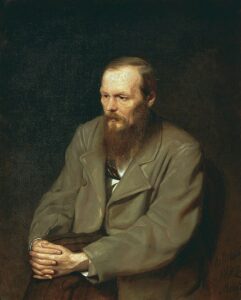
Keenan, part of the first panel on literary visions of a university’s mission, will present a paper looking at how Raskolnikov, the protagonist in Fyodor Dostoevsky’s Crime and Punishment, would fit into today’s University of Toronto, a paper she has designed to speak to the experience of current students.
She says she appreciates the opportunity the colloquium presents to engage in deep thought and conversations with professors, as well as to receive academic feedback outside the classroom.
“It’s a question of finding your group—and I’m thrilled to be back at the university,” she says.
Third-year St. Michael’s student Alexander Lynch, also be part of the first panel, will be presenting a paper on the relationships between the work of T. S. Eliot and the “forms” of modern academic English.
Although Lynch’s primary area of interest in 19th-century literature, he chose this topic because he feels Eliot’s creative and critical work offers a powerful reminder of the importance of art crossing historical and national boundaries to create universal categories.
“The colloquium is a great way to engage with St. Mike’s,” says Lynch, who is presenting for his third time. “The first year I got my feet wet and learned what the process is all about. The second time gave me the opportunity to speak with a higher level of sophistication, while this year I am interested in speaking on what is particular to me.”
He expresses excitement at the thought of an in-person event in the Basilian Common Room after so many online events, laughing, “It’s giving me temporal vertigo, having presented in the space two years ago.”
Arjun Thapar says he submitted work to the colloquium because “I have always been fascinated with learning how subjects fit together. While I am a math student, I had wonderful mentors at St. Michael’s who advised me to broaden my perspective and take courses in drama and other arts areas to meet students from completely different backgrounds. An exposure to content and nuance of different areas teaches you that there is no one solution that solves everything.”
Soon to graduate with a BSc in mathematics, Thapar, who will be on the panel looking at seeking truth in the university, says the colloquium is an important step in learning to speak collegially rather than speaking at each other.
“Institutions need to be self-critical and engage in self-reflection or else they are doomed to failure,” he says. “This event is a valued effort. When you attend university you want to emerge not only capable in your field but also with a better vision of yourself.”
Doctoral student Rashad Rehman, who will present on philosopher Josef Pieper in the second panel, says his experience teaching undergraduates has shown him the benefits of a forum like the colloquium, which can model what productive and respectful disagreement looks like, finding common ground with others at a time when there is so much moral disagreement in society.
Rehman says his experience teaching has at times revealed that students’ interest in historical injustices and reparative justice often stems primarily from a desire to engage in activism rather than a precise understanding of what has happened, adding that first one has to understand before one can act effectively.
The very idea of bringing together a group of students whose ages, areas of interests and academic career timelines demonstrates the existence—and value—of the universal in the university, Rehman says.
“The university is the place that preserves an understanding of what universal means,” he says, “and, in doing so, preserves the whole person.”
To a person, participants and organizers have expressed great excitement at being back on campus for Saturday’s event.
“It means a great deal to be to be in the Basilian Common Room, which is part of the history of St. Mike’s—to have intellectual conversations in a warm space—that’s what St. Mike’s can do at its best, broadcasting to a larger community what St. Mike’s is all about,” says Guthrie.
Knowledge, Belief, Wisdom: What’s Universal About the University? will take place Saturday, March 26 from 1 to 5 p.m. in the Basilian Common Room on the third floor of Brennan Hall. The event is free and open to the public; no advanced registration is required.
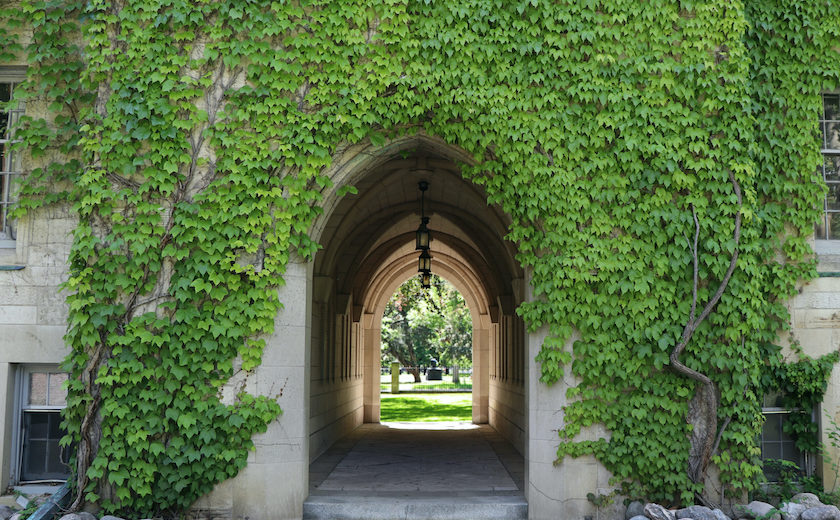
A new initiative will bring young scholars into the St. Michael’s community this fall, fostering their research and building their professional connections while enriching the campus with their expertise and enthusiasm.
The St. Michael’s College Junior Fellowship Program is designed for professional students (including those who study law and medicine), graduate students, and advanced-degree graduates who have a connection to the University of Toronto and an interest in participating in, and contributing to, the life of St. Michael’s. Junior Fellows will propose their own unique contributions, which can range from creating and facilitating topical reading groups and working groups, to participating in programming for St. Michael’s students and students enrolled in St. Michael’s sponsored programs, to creating new opportunities to enhance collegiate life in other areas. Perks include an annual research stipend, full library privileges, faculty mentorship and professional development opportunities, and access to the Faculty Dining Room and common rooms.
“I think this will foster a thriving, vibrant community of young scholars who are going to connect with each other and with members of the college—its students, faculty, and senior fellows—in ways that are distinctive to the intellectual interests and values of St. Michael’s as an institution,” says Dr. Stephen Tardif, Assistant Professor, Teaching Stream, of the Christianity and Culture Program.
Tardif says that the new program is comparable to junior fellowship programs at other U of T Colleges such as Victoria College, which in a typical year will host 10 to 20 participants. He expects a similar number of fellows in St. Michael’s program.
In addition to fostering community among young scholars, Tardif expects the program to fuel exciting research in subject areas that are distinctive to the intellectual interests and values of St. Michael’s as an institution. “Gathering together will be a process of intellectual discovery. We’re very excited to see how these kinds of connections can facilitate [the junior fellows’] own research, and how our own faculty and fellows might offer them mentorship and intellectual community,” he says.
Taking an active, shaping role in the development of the next generation of scholars is a particular benefit for current faculty in St. Michael’s sponsored programs because their teaching and mentorship is usually focused on undergraduate students. Providing mentorship to and fostering the research of graduate students creates opportunities to “shape the next generation of scholars,” Tardif says.
The deadline for applications to the St. Michael’s College Junior Fellowship Program for the 2021-2022 academic year is August 1, 2021.
Fr. Gustave Noel Ineza, OP, is a doctoral student at St. Michael’s Faculty of Theology. Born and raised in Rwanda, he lived through the 1994 genocide against the Tutsi and went into exile for a month in what was then Zaire. His family left the refugee camps and returned to Rwanda after three members of his family developed cholera. He studied in the minor seminary and joined the Dominican Order in 2002. He studied Philosophy in Burundi, and Theology in South Africa (SJTI/Pietermaritzburg) and the UK (Blackfriars/Oxford). Ordained in 2014, he worked for Domuni (www.domuni.eu) and was a chaplain to university and high school students. In 2018, he came to Canada to pursue studies in Christian-Muslim dialogue. He is currently reading on post-colonial approaches to the taxonomies assigned to religious traditions (Muslims and Christians) by colonial powers in Rwanda.
The Other Sister
The COVID-19 pandemic has taught many to value more highly essential workers who are usually underpaid after long hours of vital work. Nurses are among the most praised as they daily risk contracting the virus while trying to offer a treatment to the sick. It is not the first time that nurses, women in particular, have risked their lives to save other people’s lives during pandemics. Several pandemics affected the pre-modern world. Some of those who offered treatment to the sick were non-cloistered women religious whose identities have not been comprehensively studied. These women were part of bigger movements which flourished in the Middle Ages and Early Modern Times.
In September 2020, I joined a team of academics as an assistant researcher to Dr. Alison More. Dr. More is the undergraduate Medieval Studies coordinator and the inaugural holder of the Comper Professorship in Medieval Studies at the University of St. Michael’s College. She works on a joint project with Dr. Isabelle Cochelin (Department of History & Centre for Medieval Studies/UofT), and Dr. Isabel Harvey (Department of Humanistic Studies of the University of Venice Ca’ Foscari). The project is called “The Other Sister” and its focus is “women who pursued forms of religious life outside of the cloister in medieval and early modern western Europe and New France.” The other members of the project are Dr. Angela Carbone (University of Bari Aldo Moro) and Dr. Sylvie Duval (Università Cattolica in Milan), research assistants Laura Moncion, Emma Gabe, and Meghan Lescault (Centre for Medieval Studies or Department of History/UofT), and Camila Justino (USMC Book and Media and Mediaeval Studies).
The women studied are known by many names, including beguines, tertiaries, recluses, oblates, secular canonesses, lay sisters, pizzochere, bizzoche, beatas, and others. Their names and forms of life varied according to location. Our research group organizes thematic meetings which are the main venue for discussing current research, and recent books, chapters in books, articles, both published and forthcoming. As the COVID-19 pandemic has affected people’s movements, presenters invited from different academic institutions around the world working on aspects of the project meet by Zoom each month. Although the situation has made it impossible for people to have actual face-to-face meetings, it has allowed those on different continents to virtually meet.
To date, the group has prepared and successfully conducted five thematic meetings. The first meeting was entitled Women Serving Enclosed Women (held on September 29, 2020), the second was on Working in Premodern Hospitals (October 27, 2020), the third’s theme was Charity, Caregiving and Female Social Roles from the Middle Ages to the Early Modern Period (December 17, 2020), the fourth was on Naming The Other Sister: Tertiary, Lay, or Penitent? (February 8, 2021), and the fifth was held on Medieval and Early Modern Beguines, from Provence to Northern Europe (March 15, 2021). Details about those thematic meetings are found on the group’s blog.
The attendance has recently been reaching about 40 participants, mainly professors, post-docs, and PhD students from around the globe, all interested in the subject. Our discussion inevitably yields new insights which cross the usual temporal and geographic boundaries.
The main group of the ten researchers attached to “The Other Sister” has working meetings where we prepare the rest of our activities: thematic meetings, workshops for larger audiences, a workshop for our members on using ArcGIS Software to create maps of the communities of non-cloistered religious women, the construction and development of a blog, etc. The blog is named “The Other Sister.” It presents an overview of research and has space for recent updates and news of importance or interest to our community of scholars.
On a personal note, with this project I am learning about historical methodologies that do not aim at proving hidden agendas but analytically and objectively examine all possible data. Also, I have gained a new perspective as a student in Christian-Muslim relations. My usual methodology is historical and postcolonial. It investigates silenced and othered voices in my country’s religious identity construction. I have learned much from “The Other Sister.” Apart from the finesse in the communication of the members and the rigour in the historical research with its requirements for accuracy, I have come to appreciate the academic enthusiasm involved in understanding subjects that touch a given identity. I am also interested in understanding the power relationship between identity and those who write history: in our case, the image given to these non-cloistered, lay-religious women by predominantly male and clerical historians.
Our work values the religious zeal of women who were willing to live a life given to the poor, the sick, prayer, and teaching, often in the face of incomprehension and negative judgment from their society and the Church. Some were considered heretics or witches simply for wanting to live this life outside the walls of a cloister. A deconstruction of the meta-narrative on them that at times portrayed them as uncontrollable dangers to the Christian faith aims to restore their proper image. As the Church strives to include women in its decision-making bodies, it will surely be inspired by the findings of “The Other Sister” project, and the genius of the women working on it.
Read other InsightOut posts.
Sheril Hook, chief librarian at the John M. Kelly Library, tells the story of a University of Toronto professor calling her recently for help. The professor simply couldn’t find the materials he was searching for—Syriac-Latin text editions for the Patrologia Orientalis series, as well as articles from Analecta Bollandiana. With just a little digging, she found them, digitized from the Pontifical Institute for Mediaeval Studies (PIMS) collection, which is housed at Kelly.
“U of T is one of the top research libraries in North America. I was confident I could find the materials,” Hook says.
A library can be hard enough for an expert to navigate, so asking students to find resources remotely during physical distancing can be a challenge for those already stressed over papers, exams, and an uncertain summer.
In response, Hook and Noel McFerran, Kelly’s Theology and Rare Books librarian, are hosting a virtual town hall on Wednesday, May 6 for students in the basic and advanced degree programs at the Faculty of Theology. The afternoon session is perfect timing for theology students enrolled in intersession courses. Eligible students have received an email with instruction on how to access the online gathering, and it will be recorded for anyone who cannot make the 3-4 p.m. time slot.
The librarians have three goals for the hour-long session, which will include a 15-minute presentation, as well as time for questions posted to the forum. First, they want to do a close look with students at the U of T catalogue, delving into some of the more advanced ways to search it to discover digitized materials.
“We’d like to show people how to find materials they didn’t anticipate being online,” Hook says.
Then, they will highlight materials that have been made temporarily available to students. While in this period of physical distancing due to COVID-19, for example, students can call on the HathiTrust Emergency Temporary Access Service.
The third thing McFerran wants to stress is that the Kelly librarians are constantly discovering new materials.
“Send us an email and ask us about availability,” he says. “Just last week I had to say ‘sorry, it’s not available’ to a request, but this week that material has been digitized, so I was able to help the student after all.”
“This is a great new opportunity for learning,” says Hook, who notes that Kelly Library plans to expand sessions in the fall semester to include undergraduate students as well. “It’s important to feel comfortable in asking for help. If you can’t find something, we will look for you, as we very likely have it.”
Dr. Tamara Grdzelidze’s career has taken her from the Geneva offices of the World Council of Churches to Rome, where she served as the Georgian ambassador to the Vatican from 2014-2018. Now, her latest travels have brought her to Toronto as the Aileen Driscoll Research Fellow in Ecumenical Theology at the University of St. Michael’s College.
Midway through her year-long appointment, Dr. Grzelidze is delighted to be following in the footsteps of legendary St. Mike’s professors and conducting research at a university known for its work in ecumenism — even though her arrival on campus this past January was something of a shock.
“Certainly I knew cold. I’d been to the Alps, for example, “she laughingly recalls. “But I didn’t know what (a wind chill of) -32 felt like!”
Still, everything from conversations with Dennis Savoie, Canada’s ambassador to the Holy See, to her work at the WCC helped convince her that St. Michael’s was a logical place for her to further her work on ecumenism.
“I was familiar with some of the big names who taught at St. Mike’s – Margaret O’Gara and Étienne Gilson, for example – and I knew U of T is a very good university,” she says. “From my work with the World Council of Churches I knew that, ecumenically, (Canada) is very strong.”
The project she is working on while at St. Mike’s stems from concerns over the fallout for various Orthodox churches in the wake of the 2018 decision by the Russian Orthodox Church to sever ties to the Ecumenical Patriarchate of Constantinople, which historically has held a special place in the Eastern Orthodox world. The break came last October after Constantinople granted the Ukrainian Orthodox Church autocephaly, or permission to operate independently from Moscow.
“Having lived various places this is painful for me. Borders are not so precise,” says Dr. Grdzelidze, who is organizing a conference to take place at St. Mike’s in June, 2020, titled Boundaries of the Christian Faith in the 21st Century: Intersecting with Borders of Geography, Cuture and Theology. Earlier this year, for example, she delivered a paper, ‘National Borders of the Orthodox Church,’ at a conference in Romania.
“Ecumenism is not only about knowledge but about experience, just as theology is not just about patristics,” she explains. “It is about seeing how people interact; it serves as a compass to understand others’ beliefs, their passions.”
In the coming Fall semester, Dr. Grdzelidze will teach The Ecumenical Theology: Division, Difference, Dialogue, a course that will examine some of the major themes related to the impact of inter-church dialogue and action on theological reflection.
Educated in Tbilisi State University in Georgia, St. Vladimir’s Orthodox Theological Seminary in New York, and Oxford, Dr. Grdzelidze has taught around the world, including St. John’s Theological College in Auckland, Trinity College Dublin, and the Angelicum in Rome.

